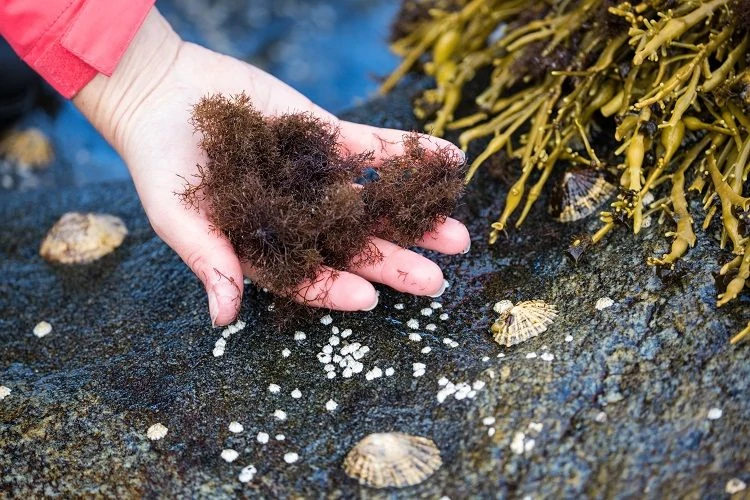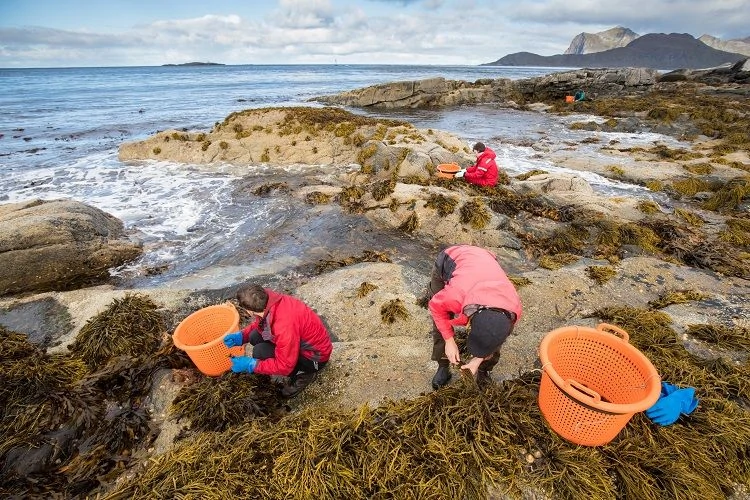Is seaweed the ultimate brain food?
Prehistoric brain food
Millions of years ago, there was an event (or series of events) that allowed homo sapiens to diverge from the primitive hominid family tree and begin the evolutionary journey towards modern humanity. In terms of physical development, our brains have undergone the most dramatic change in the last two million years. The brains of our early ancestors were engines of pure survival, whereas the organ we each have today is a complex super-computer that defies scientific understanding, and defines the very essence of humanity. So how did such a seismic change come about? The answer may lie in our favourite undersea ingredient!

Early hominids were hunter-gatherers, and it is argued that our transformation from four- to two-legged beasts was accelerated because of the long distances that we had to travel to find food. It comes as no surprise that these hunter-gatherers gravitated naturally towards coastal regions, where food sources were plentiful and predators few and far between. However, their primitive understanding of the tides may have meant that they weren’t the most effective fishermen. Mouritsen et al writes:
“Our ancestors would find foods like fish, crustaceans, snails, seaweeds, bird eggs and perhaps occasional dead marine vertebrates. But they probably did not have the necessary rudimental understanding of seasonal tidal cycles and their influence on shellfish availability. Seaweeds of different types, on the other hands, can be found all across the intertidal zone from the high water mark to the subtidal regions and they could be readily and repeatedly harvested for food by all family members, including women and children.”

As our ancestors roamed further and further, they would have needed more and more energy from their food. The brain specifically is an extremely energy-hungry part of the body, and cannot function without certain minerals like zinc and magnesium. Seaweed is rich in these brain-nourishing nutrients, and it is argued in several studies that access to an abundance of these nutrients in the early stages of our evolution probably contributed to our rapid brain development.
Modern brain food
Nowadays, our understanding of the connection between the gut and the brain is more concrete. There are around 100 trillion bacteria living in our guts, collectively known as the gut microbiome. The average human has just as much (if not more) bacteria than human cells, most of which we enjoy a happy, symbiotic relationship with. The gut microbiome helps our body digest food, process nutrients, make vitamins, fight infections and heal wounds. There is even a line of biochemical communication between the gut and the brain, called the gut-brain axis. Your gut health has a direct and significant effect on your brain health. Did you know for example that 90% of the emotion-regulating hormone serotonin is produced in the gut?

Gut bacteria thrive on the food we eat, and the increasing popularity of probiotic food like yoghurt and kimchi shows that more of us are keen to boost the good bacteria in our gut. But for all this good intention, we may be missing out on a key element of a probiotic diet: seaweed! Recent studies show that the bacteria able to digest seaweed – bacteroidetes – actually out-perform other bacteria in many areas. Not only this, but bacteroidetes can actually ‘teach’ native bacteria how to digest the fibres found in seaweed, which has exciting implications in the genetic-engineering field. If bacteroidetes can teach other bacteria how to digest seaweed, what other information can be shared?
A recent Alzheimer’s study which focused on the gut microbiomes of a group of patients showed a unique, much less diverse range of bacteria compared to the control group. It’s even argued that the lack of diversity in the gut may be a contributing factor in the progression of the disease. The suggestion that this devastating, little-understood condition could be prevented by maintaining a healthy, diverse composition of gut bacteria is an enticing prospect. There is clear value in promoting a varied, probiotic diet, especially in communities where this may have been forgotten, such as the fast-food culture of the west.
To sum it up: seaweed might just be the ultimate brain food! It houses complex bacteria that are essential for a diverse and healthy gut microbiome, and contains the zinc and magnesium that the brain needs to function. Seaweed may have helped our early human ancestors develop into the philosophical, scientific, emotional creatures we are today. Best of all, it’s available, sustainable and delicious – so try seaweed for your next brain-healthy meal!